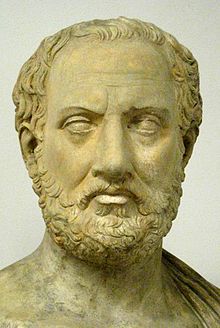
Peter Kosso [link is to his academic page], a philosopher of epistemology (or “philosopher of how we know things”), explains how historians can know “what actually happened” in ancient times. I would love to see scholars like Kosso direct their understanding and criticism to attempted explanations by biblical scholars. Well, this post is an indirect attempt to do just that by picking out some of the most salient points of his article. (Though I would love to do so, I don’t cover all the aspects and subtleties of Kosso’s essay.)
Kosso, Peter. 1993. “Historical Evidence and Epistemic Justification: Thucydides as a Case Study.” History and Theory 32 (1): 1–13. https://doi.org/10.2307/2505326.
Kosso illustrates his arguments with reference to the ancient historian with the reputation of being the father of scientific history, Thucydides.
How can we know if we can trust Thucydides’ account of the Peloponnesian war?
There are two possible ways of going about answering this question. One is external and the other internal.
- External: We can turn to outside sources, other texts or archaeological evidence, to test the claims of Thucydides.
- Internal: We can examine what was written by Thucydides himself and make a judgement based on what he himself says about himself and his work.

Four kinds of corroboration
#1 Material evidence: If surviving architectural monuments and natural terrain match what an ancient historian says then the text gains “a measure of justification”.
#2 If different authors write about the same or related things then to the extent that their accounts are consistent and further our understanding of events then “each gains credibility”.
#3 If another ancient work refers to Thucydides and discusses both him as a person and how he went about his work then we gain helpful background information to what we are reading in Thucydides’ history. But that report on Thucydides must be independent and not composed by a sycophant seeking the favours of Thucydides himself, of course.
This is to block the circularity of a theory accounting for its own evidence, a circularity that would make the testing vacuous. For the same reason, a textual source of information about some particular textual evidence must be independent of that evidence. The author of the accounting claims, for example, must not be a sycophant of the historian being described, but must have an independent source of credibility. (p. 4)
#4 What does the author say about himself and how he went about collecting his information? Does he display an awareness of the difference between eyewitness and hearsay evidence? Does he present both sides of conflicts or is he clearly biased? Do we find attention to detail? Are his explanations coherent? Is he vague in his descriptions or does he inspire confidence with realistic pictures of what actually happened? All of these features “might be used as indicators of accuracy and credibility.”
Putting Thucydides to the above tests
Continue reading “How We Know “What Actually Happened” in Ancient Times”
